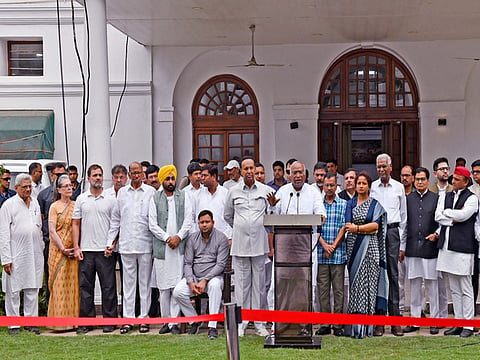

NEW DELHI: When the INDIA bloc made a stunning comeback in the 2024 Lok Sabha elections — the world’s largest democratic exercise — political pundits compared it with the successful 1977 model of the Opposition parties coming together to dislodge Indira Gandhi.
Though the Opposition alliance ended up as runners-up in the fiercely fought electoral battle, their major accomplishment was denying the BJP the magic figure of 272 seats, needed to form the government.
The NDA alliance led by Prime Minister Narendra Modi came back to a third term in power with 292 seats.
The INDIA bloc had more reasons to cheer about the electoral outcome as it has been widely predicted that the alliance is bound to crumble due to infighting and vested interests. Moreover, surveys and experts were also skeptical about the alliance’s ability to trump the BJP’s electoral invincibility and its narratives on economic success and Hindutva.
The differences among the INDIA bloc partners came to the fore in several instances. In West Bengal, CM Mamata Banerjee refused to cede any seats to Congress in the state. In Bihar, the alliance suffered a huge blow after Nitish Kumar-led Janata Dal-United (JDU) jumped ship to join the BJP-led NDA. Many attribute the impressive performance of the Opposition to its campaigns around ‘fight to protect the Constitution and democracy’.
Though the stunning performance of the Opposition parties was interpreted as a churn in the political landscape and a revival for the principal opposition Congress party and its allies, skeptics were many.
Six months down the line, the anti-BJP camp seems to grapple with internal conflicts after the BJP’s massive electoral triumphs in the Haryana and Maharashtra Assembly polls.
The recently concluded Winter Session of Parliament further exposed the cracks in the Opposition unity with several alliance partners questioning the Congress’s ability to lead the coalition. As the fulcrum of the alliance, the Congress faced criticism from several leaders of the Opposition INDIA bloc as they accused the grand old party of being ‘arrogant, overconfident and entitled’. The constituents had attributed the party’s poor show to the ‘overconfidence and arrogance’ of the state leadership.
The unease among the allies is palpable with several parties including Samajwadi party (SP), Shiv Sena (UBT), and RJD supporting Mamata Banerjee as the face of the alliance.
Though the beginning of the winter session saw parties such as SP, TMC and AAP distancing themselves from the Congress over raising the Adani issue in parliament, the row over Home Minister Amit Shah’s remarks over Ambedkar led to the regrouping of the parties.
The challenge for the parties will be the impending assembly elections in Delhi and Bihar, where the alliances will be put to the test. If the Congress fails to perform in these polls, the chorus for the grand old party to step down from the leadership role will only grow.